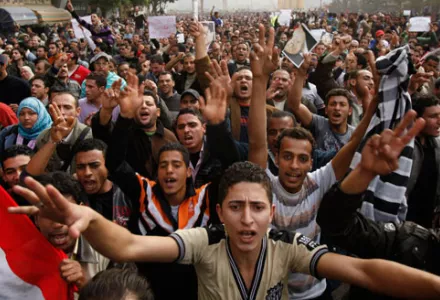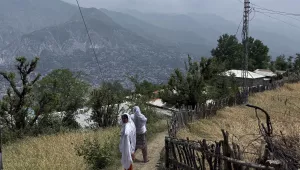REVOLUTION & REFORM:
The Historic Transition in the Middle East
The Dubai Initiative
Belfer Center for Science and International Affairs
Harvard Kennedy School of Government
Youth Movements • Political Transformation
Foreign Policy • Energy • Urbanization
The first major U.S. conference on the Middle East’s political transformation. Featuring plenary sessions with leading scholars and policymakers, panel discussions moderated by Dubai Initiative Fellows, and a pioneering workshop on Arab urbanization.
Facebook: http://on.fb.me/HarvardArabConf
Twitter: http://twitter.com/HarvardArabConf
The Charles Hotel
April 8 & 9, 2011
Free; no registration required
Meals & refreshments provided
CONFERENCE PROGRAM
Day 1: April 8, 2011
10:00 - 11:00 AM Opening Session - Nicholas Burns, Harvard Kennedy School; Ashraf Hegazy, Harvard Kennedy School
11:15 - 12:30 Political Transformation in the Arab World: Economics, Democracy, and Change
Tarek Masoud, Harvard Kennedy School; Amaney Jamal, Princeton University; Tamim Al-Barghouti, Georgetown University; Helga Tawil-Souri, New York University; Karam Dana, Dubai Initiative (moderator)
12:30 - 12:45 Remarks - Dean David T. Ellwood, Harvard Kennedy School
12:45 - 2:00 Lunch
2:00 - 3:15 Between Order and Liberalization: The Rule of Law and Politics in the Arab World
Nathan Brown, George Washington University; Angela Conway, American Bar Association; Malik Dahlan, Institution Quraysh for Law & Policy; Amr Shalakany, American University in Cairo; David Mednicoff, Dubai Initiative (moderator)
3:20 - 4:35 Generation in Revolt: What Do Middle East Youth Want?
Ehsan Moghaddasi, Boston University; Ali Banuazizi, Boston College; Diane Singerman, American University; Djavad Salehi-Isfahani and Mehrangiz Kar, Dubai Initiative (moderators)
4:35-4:55 Break
5:00 - 6:15 What’s Next for the Arab World
Samer Shehata, Georgetown University; Stephen M. Walt, Harvard Kennedy School; Ayman Mohyeldin, Al Jazeera; Emad Shahin, University of Notre Dame; Diana Buttu, Dubai Initiative (moderator)
Day 2 - Sat. April 9, 2011
8:00 - 9:00 AM Breakfast
9:00 - 10:15 Urban Trends in Globalizing Middle Eastern Cities: Challenges and Potential
Stephen Ramos, Harvard Kennedy School; Amr Moustafa; James Steele; Hussam Salama, Dubai Initiative (moderator)
10:15 - 10:45 Break
10:45 AM - 12:00 PM Energy: The Key to Economic Modernization in the MENA Region
Nadia Logab, chez Bureau Veritas Algerie (oil and gas); Atul Arya, IHS Cambridge Energy Research; Noura Mansouri, University of London; Laura Atkins, Hart Energy; Justin Dargin, Dubai Initiative (moderator)
12:00 - 1:30 Lunch
1:30 - 2:45 Roundtable - New Challenges to International Relations with the Middle East
Meghan O'Sullivan, Harvard Kennedy School
URBANIZATION WORKSHOP
The conference will also include a pioneering, invitation-only workshop that will bring scholars of Arab urbanization together to evaluate an emerging field. Key findings will be presented during the urbanization panel on April 9.
Urbanism in the Middle East: A Search for New Paradigms
Workshop Organizer: Hussam Salama, Dubai Initiative
This workshop brings together prominent scholars, experts, and professionals in order to discuss the challenges facing the contemporary urban condition in Middle Eastern cities. We aim to emphasize the role of urbanization in shaping the future of the Middle East and its capacity to deal with the new regional and global order. The workshop has two objectives:
1. Analyzing the policies, measures, and conceptions that shape the current trends of urban development in the region
2. Exploring and conceptualizing new possible design and planning paradigms that can deal with persisting urban challenges and make the best use of existing opportunities
For more information, contact Beth Johnson at egjohns@fas.harvard.edu or Duncan Pickard at duncan_pickard@hks12.harvard.edu.



